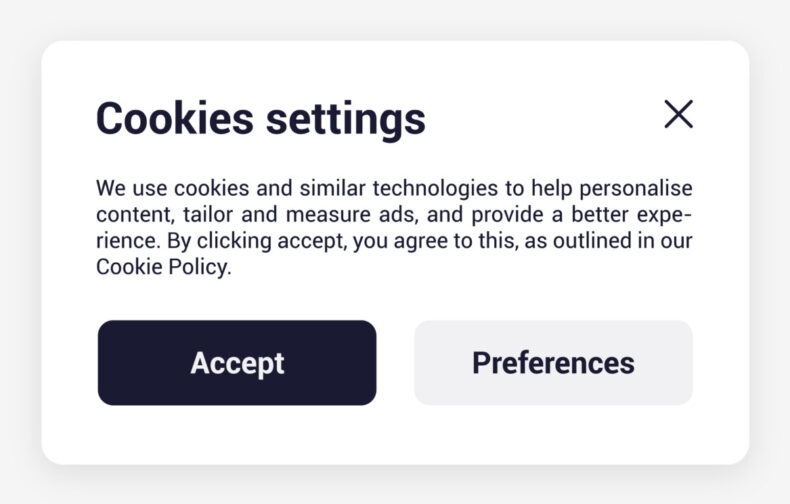
Introduction
In today’s digital landscape, cookies are crucial in tracking user behavior and enabling personalized advertising. However, the cookie-based marketing model is undergoing a significant transformation with increasing privacy concerns and evolving regulations. Business owners need to grasp the concept of cookies, comprehend the difference between first-party and third-party cookies, and understand how the absence of cookies can impact their marketing strategies. This article aims to educate business owners on these aspects, empowering them to thrive in a cookie-less world.

What is a Cookie?
Cookies are small text files that websites store on a user’s device when they visit a particular site. These cookies collect browsing history, preferences, and other information. The collected data helps websites remember user preferences and deliver a personalized browsing experience.
The Difference Between First-Party and Third-Party Cookies:
First-party cookies are placed by the website the user visits. They primarily enhance the user experience by remembering login details, language preferences, and shopping cart contents. First-party cookies are generally considered less invasive from a privacy standpoint, as they are limited to the specific website.
On the other hand, third-party cookies are created by domains other than the website the user visits. Advertisers and marketers often utilize them to track user behavior across multiple sites. Third-party cookies allow for more targeted advertising and retargeting campaigns. However, they have raised concerns about user privacy and data security.
What a Cookie-Less World Means for Marketing:
The transition to a cookie-less world has significant implications for marketing strategies. As privacy concerns and regulatory changes take center stage, businesses should consider understanding the challenges and opportunities presented by the absence of cookies.
 Limited User Tracking and Targeting: In a cookie-less world, businesses will have limited access to user data, making it more challenging to track individual user behavior across different websites. This limitation directly impacts targeted advertising and retargeting campaigns, which heavily rely on third-party cookies to deliver personalized messages. Marketers will face challenges in understanding their audience’s preferences, interests, and intent, making it difficult to tailor marketing efforts effectively.
Limited User Tracking and Targeting: In a cookie-less world, businesses will have limited access to user data, making it more challenging to track individual user behavior across different websites. This limitation directly impacts targeted advertising and retargeting campaigns, which heavily rely on third-party cookies to deliver personalized messages. Marketers will face challenges in understanding their audience’s preferences, interests, and intent, making it difficult to tailor marketing efforts effectively.
- Shift towards Privacy-Centric Marketing: The rise of privacy regulations and consumer demands for data protection requires marketers to prioritize privacy-centric marketing practices. With the diminishing reliance on third-party cookies, businesses should consider seeking alternative ways to respect user privacy while delivering relevant experiences. This shift involves focusing on consent-based data collection, transparent data usage policies, and implementing privacy-by-design principles in marketing strategies.
- Importance of First-Party Data: In a cookie-less world, the value of first-party data increases significantly. First-party data, collected directly from users who engage with a business’s website or app, become the primary source of insights for personalization and targeting. Businesses need to invest in strategies to capture and leverage first-party data effectively. This includes implementing user registration, loyalty programs, surveys, and preference centers to gather valuable information directly from their customers.
 Evolving Attribution and Measurement: The absence of third-party cookies challenges traditional attribution models and measurement practices. Marketers should consider exploring privacy-centric measurement solutions that rely on aggregated and anonymized data to track and attribute conversions. Cohort analysis, differential privacy techniques, and multi-touch attribution models can help businesses gather meaningful insights while respecting user privacy. Adapting measurement strategies to the cookie-less landscape is essential for accurately assessing marketing performance and optimizing campaigns.
Evolving Attribution and Measurement: The absence of third-party cookies challenges traditional attribution models and measurement practices. Marketers should consider exploring privacy-centric measurement solutions that rely on aggregated and anonymized data to track and attribute conversions. Cohort analysis, differential privacy techniques, and multi-touch attribution models can help businesses gather meaningful insights while respecting user privacy. Adapting measurement strategies to the cookie-less landscape is essential for accurately assessing marketing performance and optimizing campaigns.
How to Thrive in a Cookie-Less World:
- Focus on First-Party Data and Consent Management: In a cookie-less world, businesses should prioritize collecting and leveraging first-party data. Encourage users to consent to collect data through mechanisms like newsletter sign-ups, preference centers, or account creation. By obtaining explicit consent, businesses can gather valuable insights directly from their audience, enabling them to personalize marketing efforts while respecting privacy regulations. Implement robust consent management systems to ensure transparency and control over data collection and usage, building customer trust.
 Embrace Contextual Advertising and Targeting: With the limitations of third-party cookies, contextual advertising gains significance. Rather than relying on individual user data, contextual advertising aligns ads with the content users consume. Businesses can deliver relevant messages without relying on personal data by analyzing page context, keywords, and user intent. This approach ensures compliance with privacy regulations while still enabling targeted advertising. Invest in technologies that analyze content and user behavior to serve ads that are contextually relevant and valuable to the audience.
Embrace Contextual Advertising and Targeting: With the limitations of third-party cookies, contextual advertising gains significance. Rather than relying on individual user data, contextual advertising aligns ads with the content users consume. Businesses can deliver relevant messages without relying on personal data by analyzing page context, keywords, and user intent. This approach ensures compliance with privacy regulations while still enabling targeted advertising. Invest in technologies that analyze content and user behavior to serve ads that are contextually relevant and valuable to the audience.
- Leverage Advanced Technologies: To fill the gap left by diminishing cookie-based tracking, businesses should explore emerging technologies such as machine learning and artificial intelligence. These technologies can analyze large data sets, identify patterns, and derive actionable insights, enabling businesses to create personalized experiences without relying heavily on cookies. Implement AI-powered algorithms to segment and target audiences based on behavioral patterns, preferences, and contextual signals. Utilize machine learning models to optimize campaign performance and predict user behavior, enhancing the effectiveness of marketing efforts in a cookie-less environment.
- Foster Collaborative Partnerships: Collaboration between businesses and trusted partners becomes crucial in a cookie-less world. Partnering with publishers, data providers, and advertising platforms can provide access to quality data and alternative targeting methods. Seek partnerships that adhere to privacy standards and align with your business goals. These collaborations can help overcome the limitations posed by the absence of third-party cookies and enable businesses to leverage diverse data sources for effective targeting and campaign optimization.
- Invest in Privacy-Centric Measurement and Attribution: Measurement and attribution become more challenging in a cookie-less world. Businesses should invest in privacy-centric measurement solutions that rely on aggregated and anonymized data. These solutions help track and attribute conversions while safeguarding user privacy. Explore privacy-focused analytics tools that utilize differential privacy techniques, cohort analysis, or multi-touch attribution models.
Closing
The transition to a cookie-less world presents challenges for SEO and marketers, but it is important to approach it as a natural progression in the digital landscape. Rather than giving up, the key is to embrace the change and actively seek out strategies that suit each company’s unique needs. This involves adapting to alternative data collection methods, focusing on personalized and relevant content, and staying informed about industry trends and best practices. By embracing the opportunities for innovation and maintaining a proactive mindset, SEO and marketers can navigate this new landscape, build stronger audience relationships, and drive impactful results for their businesses.
Contact Us today to discuss your marketing strategy, discover innovative solutions tailored to your business needs, and take the first step towards thriving in a cookie-less world.

 Limited User Tracking and Targeting: In a cookie-less world, businesses will have limited access to user data, making it more challenging to track individual user behavior across different websites. This limitation directly impacts targeted advertising and retargeting campaigns, which heavily rely on third-party cookies to deliver personalized messages. Marketers will face challenges in understanding their audience’s preferences, interests, and intent, making it difficult to tailor marketing efforts effectively.
Limited User Tracking and Targeting: In a cookie-less world, businesses will have limited access to user data, making it more challenging to track individual user behavior across different websites. This limitation directly impacts targeted advertising and retargeting campaigns, which heavily rely on third-party cookies to deliver personalized messages. Marketers will face challenges in understanding their audience’s preferences, interests, and intent, making it difficult to tailor marketing efforts effectively. Evolving Attribution and Measurement: The absence of third-party cookies challenges traditional attribution models and measurement practices. Marketers should consider exploring privacy-centric measurement solutions that rely on aggregated and anonymized data to track and attribute conversions. Cohort analysis, differential privacy techniques, and multi-touch attribution models can help businesses gather meaningful insights while respecting user privacy. Adapting measurement strategies to the cookie-less landscape is essential for accurately assessing marketing performance and optimizing campaigns.
Evolving Attribution and Measurement: The absence of third-party cookies challenges traditional attribution models and measurement practices. Marketers should consider exploring privacy-centric measurement solutions that rely on aggregated and anonymized data to track and attribute conversions. Cohort analysis, differential privacy techniques, and multi-touch attribution models can help businesses gather meaningful insights while respecting user privacy. Adapting measurement strategies to the cookie-less landscape is essential for accurately assessing marketing performance and optimizing campaigns. Embrace Contextual Advertising and Targeting: With the limitations of third-party cookies, contextual advertising gains significance. Rather than relying on individual user data, contextual advertising aligns ads with the content users consume. Businesses can deliver relevant messages without relying on personal data by analyzing page context, keywords, and user intent. This approach ensures compliance with privacy regulations while still enabling targeted advertising. Invest in technologies that analyze content and user behavior to serve ads that are contextually relevant and valuable to the audience.
Embrace Contextual Advertising and Targeting: With the limitations of third-party cookies, contextual advertising gains significance. Rather than relying on individual user data, contextual advertising aligns ads with the content users consume. Businesses can deliver relevant messages without relying on personal data by analyzing page context, keywords, and user intent. This approach ensures compliance with privacy regulations while still enabling targeted advertising. Invest in technologies that analyze content and user behavior to serve ads that are contextually relevant and valuable to the audience.